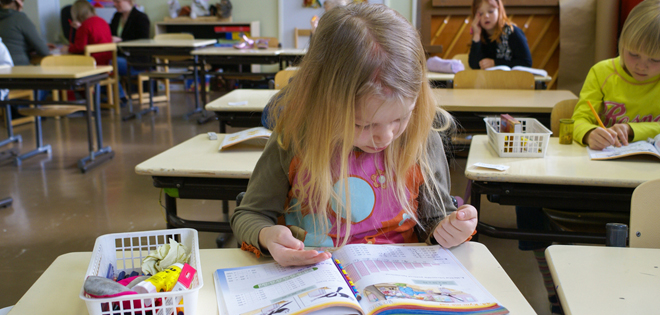Students born just after New Year perform better

The relative age of children starting school has an impact on how they succeed in their studies.
 Photo: Michal Knitl / Shutterstock.com
Photo: Michal Knitl / Shutterstock.com
Children born just after New Year finish school with a higher average in theoretical subjects than those born at the end of the year. They are also more likely to be admitted to an upper secondary school, and to graduate.
A recent study by Martti Kaila shows that the comprehensive school diploma’s theoretical subject average of children born just after New Year is 0.15 grade points higher than that of children born at the end of the year.
Kaila found a causal relationship between the relative school starting age and three educational variables: the theoretical subject average in the comprehensive school diploma, the probability of being admitted to an upper secondary school, and the probability of graduating from upper secondary school. The observed relative age effect was found to be more pronounced among girls than among boys.
The term relative age effect describes the fact that Finnish children born early in the year are nearly a year older when starting school than children born late in the same year.
According to Kaila, there are three mechanisms that may explain the difference in academic results between these groups of children.
“Firstly, children who start school later may be closer to the ideal age for learning”, Kaila says.
“Secondly, the relative phase of development, compared to other children in the class, may explain the difference. Children born early in the year may be further along in their physical growth, which will reflect on their self-confidence, for example, and further on their success in studies. On the other hand, the better learning results of the older classmates may also boost the motivation of those born late in the year to study harder”, Kaila says.
“Thirdly, it is possible that the difference observed is related to the fact that when having exams, those born early in the year may succeed better because they have had more time to accumulate knowledge in their life. The difference may therefore not be directly related to studies at school.”
It was not possible to determine the exact impact of the three separate mechanisms within the study.
The data for the study was taken from the joint application system register maintained by the Finnish National Board of Education. The extensive data covers all adolescents who participated in the joint application procedure for upper secondary level education on their year of graduating from comprehensive school.
Publication:
The Effects of Relative School Starting Age on Educational Outcomes in Finland. VATT Working Papers 84.
More information:
Martti Kaila, Research Assistant, tel. +358 40 357 3291
Labour markets and education
Local public finance and provision of public services
Press release
Press release
economics of education
education and training
education choices
elementary schools
relative age effect
upper secondary schools

